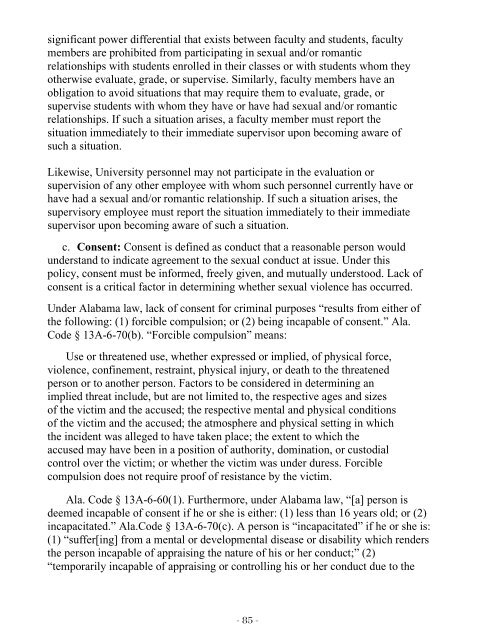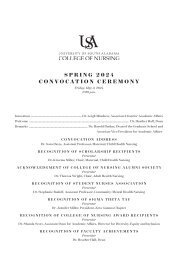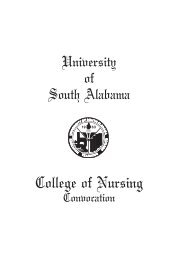The Lowdown 23-24
University of South Alabama Student Handbook
University of South Alabama Student Handbook
You also want an ePaper? Increase the reach of your titles
YUMPU automatically turns print PDFs into web optimized ePapers that Google loves.
significant power differential that exists between faculty and students, faculty<br />
members are prohibited from participating in sexual and/or romantic<br />
relationships with students enrolled in their classes or with students whom they<br />
otherwise evaluate, grade, or supervise. Similarly, faculty members have an<br />
obligation to avoid situations that may require them to evaluate, grade, or<br />
supervise students with whom they have or have had sexual and/or romantic<br />
relationships. If such a situation arises, a faculty member must report the<br />
situation immediately to their immediate supervisor upon becoming aware of<br />
such a situation.<br />
Likewise, University personnel may not participate in the evaluation or<br />
supervision of any other employee with whom such personnel currently have or<br />
have had a sexual and/or romantic relationship. If such a situation arises, the<br />
supervisory employee must report the situation immediately to their immediate<br />
supervisor upon becoming aware of such a situation.<br />
c. Consent: Consent is defined as conduct that a reasonable person would<br />
understand to indicate agreement to the sexual conduct at issue. Under this<br />
policy, consent must be informed, freely given, and mutually understood. Lack of<br />
consent is a critical factor in determining whether sexual violence has occurred.<br />
Under Alabama law, lack of consent for criminal purposes “results from either of<br />
the following: (1) forcible compulsion; or (2) being incapable of consent.” Ala.<br />
Code § 13A-6-70(b). “Forcible compulsion” means:<br />
Use or threatened use, whether expressed or implied, of physical force,<br />
violence, confinement, restraint, physical injury, or death to the threatened<br />
person or to another person. Factors to be considered in determining an<br />
implied threat include, but are not limited to, the respective ages and sizes<br />
of the victim and the accused; the respective mental and physical conditions<br />
of the victim and the accused; the atmosphere and physical setting in which<br />
the incident was alleged to have taken place; the extent to which the<br />
accused may have been in a position of authority, domination, or custodial<br />
control over the victim; or whether the victim was under duress. Forcible<br />
compulsion does not require proof of resistance by the victim.<br />
Ala. Code § 13A-6-60(1). Furthermore, under Alabama law, “[a] person is<br />
deemed incapable of consent if he or she is either: (1) less than 16 years old; or (2)<br />
incapacitated.” Ala.Code § 13A-6-70(c). A person is “incapacitated” if he or she is:<br />
(1) “suffer[ing] from a mental or developmental disease or disability which renders<br />
the person incapable of appraising the nature of his or her conduct;” (2)<br />
“temporarily incapable of appraising or controlling his or her conduct due to the<br />
- 85 -
















